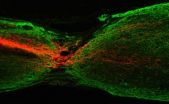Researchers simulated the trading floor in the lab by having volunteers buy and sell assets among themselves. They measured the volunteers' natural hormone levels in one experiment and artificially raised them in another.
When given doses of either hormone, the volunteers invested more in risky assets.
The researchers think the stressful and competitive environment of financial markets may promote high levels of cortisol and testosterone in traders. Cortisol is elevated in response to physical or psychological stress, increasing blood sugar and preparing the body for a fight-or-flight response. Previous studies have shown that men with higher testosterone levels are more likely to be confident and successful in competitive situations.
The authors of the new study, published in Scientific Reports, suggest the findings should be considered by policymakers looking to develop more stable financial institutions.
"Our view is that hormonal changes can help us understand traders' behaviour, particularly during periods of financial instability," said Dr Carlos Cueva, one of the lead authors of the study, from the Department of Economics at the University of Alicante.
Dr Ed Roberts, one of the lead authors of the study, from the Department of Medicine at Imperial College London, said: "Our aim is to understand more about what these hormones do. Then we can look at the environment in which traders work, and think about whether it's too stressful or too competitive. These factors could be affecting traders' hormones and having an impact on their decision-making."
First the researchers measured levels of the two hormones in saliva samples of 142 volunteers, male and female, playing an asset trading game in groups of around 10. Those who had higher levels of cortisol were more likely to take risks, and high levels in the group were associated with instability in prices.
In a follow-up experiment, 75 young men were given either cortisol or testosterone before playing the game, once with the hormone and once on a placebo. Both hormones shifted investment towards riskier assets. Cortisol appeared to directly affect volunteers' preference for riskier assets, while testosterone seemed to increase optimism about how prices would change in the future.
"The results suggest that cortisol and testosterone promote risky investment behaviour in the short run," said Dr Roberts. "We only looked at the acute effects of the hormones in the lab. It would be interesting to measure traders' hormone levels in the real world, and also to see what the longer term effects might be."
Economists have long recognised that the unpredictability of human behaviour can make financial markets unstable. John Maynard Keynes wrote of "animal spirits" and Alan Greenspan and Robert Shiller alluded to "irrational exuberance" as a possible cause of overvaluations in asset markets. However, scientists have only recently begun to explore the physiological basis for this phenomenon.
Professor Joe Herbert, a co-author of this study from the Department of Clinical Neurosciences at the University of Cambridge, reported in an earlier field study that traders made significantly higher profits on days when their morning testosterone levels were above their daily average, and that increased variability in profits and uncertainty in the market were strongly correlated with elevations in their cortisol levels.
INFORMATION:
The research was funded by the Economic and Social Research Council and the Medical Research Council.
For more information please contact:
Sam Wong
Research Media Officer
Imperial College London
Email: sam.wong@imperial.ac.uk
Tel: +44(0)20 7594 2198
Out of hours duty press officer: +44(0)7803 886 248
Notes to editors:
1. C. Cueva et al. 'Cortisol and testosterone increase financial risk taking and may destabilize markets.' Scientific Reports, 2 July 2015.
After the embargo, the paper can be found at http://nature.com/articles/doi:10.1038/10.1038/srep11206.
2. About Imperial College London
Imperial College London is one of the world's leading universities. The College's 14,000 students and 7,500 staff are expanding the frontiers of knowledge in science, medicine, engineering and business, and translating their discoveries into benefits for society.
Founded in 1907, Imperial builds on a distinguished past - having pioneered penicillin, holography and fibre optics - to shape the future. Imperial researchers work across disciplines to improve global health, tackle climate change, develop sustainable energy technology and address security challenges. This blend of academic excellence and its real-world application feeds into Imperial's exceptional learning environment, where students participate in research to push the limits of their degrees.
Imperial nurtures a dynamic enterprise culture, where collaborations with industrial, healthcare and international partners are the norm. In 2007, Imperial College London and Imperial College Healthcare NHS Trust formed the UK's first Academic Health Science Centre. This unique partnership aims to improve the quality of life of patients and populations by taking new discoveries and translating them into new therapies as quickly as possible.
Imperial has nine London campuses, including Imperial West: a new 25 acre research and innovation centre in White City, west London. At Imperial West, researchers, businesses and higher education partners will co-locate to create value from ideas on a global scale.
http://www.imperial.ac.uk
3. About the Economic and Social Research Council (ESRC)
The Economic and Social Research Council (ESRC) is the UK's largest funder of research on the social and economic questions facing us today. It supports the development and training of the UK's future social scientists and also funds major studies that provide the infrastructure for research. ESRC-funded research informs policymakers and practitioners and helps make businesses, voluntary bodies and other organisations more effective. The ESRC also works collaboratively with six other UK research councils and Innovate UK to fund cross-disciplinary research and innovation addressing major societal challenges. The ESRC is an independent organisation, established by Royal Charter in 1965, and funded mainly by the Government. In 2015 it celebrates its 50th anniversary. http://www.esrc.ac.uk
4. About the Medical Research Council
The Medical Research Council has been at the forefront of scientific discovery to improve human health. Founded in 1913 to tackle tuberculosis, the MRC now invests taxpayers' money in some of the best medical research in the world across every area of health. Thirty MRC-funded researchers have won Nobel prizes in a wide range of disciplines, and MRC scientists have been behind such diverse discoveries as vitamins, the structure of DNA and the link between smoking and cancer, as well as achievements such as pioneering the use of randomised controlled trials, the invention of MRI scanning, and the development of a group of antibodies used in the making of some of the most successful drugs ever developed. Today, MRC-funded scientists tackle some of the greatest health problems facing humanity in the 21st century, from the rising tide of chronic diseases associated with ageing to the threats posed by rapidly mutating micro-organisms. http://www.mrc.ac.uk


